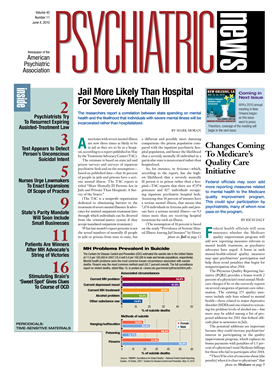Ken Libertoff, Ph.D., was a passionate basketball player in the 1960s. But during the past three decades, he's been shooting hoops for mental health, so to speak, and scoring big (see
Legislative Work as a Contact Sport).
As executive director of the Vermont Association for Mental Health (VAMH), which is an affiliate of the national advocacy group Mental Health America, he's achieved some stunning successes in getting mental health legislation passed—successes that have impacted people favorably not only in Vermont, but across the country.
“Ken is a deeply compassionate human being who has spent much of his professional life standing up for people who have trouble standing up for themselves,” Howard Dean, M.D., former governor of Vermont and former chair of the Democratic National Committee, told Psychiatric News.
“As a person, he's engaging, dynamic, outgoing, and funny,” Alice Silverman, M.D., president of the Vermont Psychiatric Association, said. “He's got a good sense of humor.”
Decision 'Reckless' but Compassionate
It all started in 1981. Libertoff, with a doctorate in clinical psychology and public practice from Harvard University under his belt, and with a weakness for the underdog, agreed to become director of an almost-bankrupt VAMH. The association didn't even have a typewriter. Libertoff had to use a mimeograph machine to print material, and ink splattered all over the place—“sort of like a few steps beyond Ben Franklin,” Libertoff recalled. “In some ways it was a reckless decision that didn't hold much promise at the time.”
He worked hard to bring the VAMH up to speed. “We realized that if we were going to do a lot of public-policy work at the state level, we had to conceive of the VAMH as being a political movement and build membership in the association brick by brick,” he said. “We reached out to parents, to consumers, to professional groups, to citizens who, for whatever reason, had an interest in mental health or mental illness.”
In 1984, he started working on trying to get mental health insurance parity passed in Vermont. “We started recruiting, very slowly, a small cadre of legislators who were interested in this issue, which at the time seemed so radical, so unique,” he recalled. “One of the legislators was a young doctor who ended up becoming an important player in this campaign over the decade. His name was Rep. Howard Dean from Burlington. Howard was an internist, but he truly understood from the point of view of being an internist how many of the problems he diagnosed had a psychiatric–mental health dynamic and how poorly insurance covered treatment of those conditions.”
“We also carefully built a coalition of the public, particularly parents, who really grasped the importance of this issue because of personal life experience,” he pointed out—for example, parents whose teenage children had reached the $10,000 limit on mental health insurance coverage and who couldn't afford to pay for care out of their own pockets.
Defining Moment Arrives With Parity
In 1997 came the defining moment—a mental health insurance parity bill was passed by the Vermont legislature, signed into law by then-governor Dean and became the strongest parity bill in the United States. It is still viewed as the strongest model for mental health insurance parity in the country, according to many observers. “Ken's advocacy is largely responsible for Vermont's law, which is held as the national standard,” David Shern, Ph.D., president and CEO of Mental Health America, told Psychiatric News.
From 1997 to 2007, Libertoff visited 35 states to provide consultation and advice regarding mental health insurance parity implementation. “I wrote a primer on how we passed our bill and on how other states could incorporate some of our approaches and strategies. I think it turned out to be a useful book for many states.”
He was also invited to South Africa to discuss the Vermont mental health insurance parity law that he had helped achieve. “If you are living in Vermont and suddenly find yourself in Cape Town or Johannesburg, you definitely feel like you are getting somewhere,” Libertoff observed.
Libertoff was also able to get the Substance Abuse and Mental Health Services Administration to study the outcome of the Vermont mental health insurance parity law and to demonstrate that “when you offer parity on all conditions of mental health and substance abuse, the cost is no more than 3 percent beyond the usual health insurance premium costs, even though insurance industry leaders predicted it would be 10, 12, or even 15 percent more.” This evidence, he believes, had a favorable influence on passage of the national mental health insurance parity bill in 2009.
Moreover, “his work with the Vermont delegation [to Congress] substantially improved the national parity bill when they, [along with members of Congress from] New York and Connecticut, insisted on some changes that Washington advocates had abandoned as nonachievable,” Shern noted.
In addition to his parity coup, Libertoff helped get the Vermont legislature to pass several pieces of legislation regarding regulation of the managed care industry—one in 1994 and one in 2000. The legislation is now being replicated in several states.
Then last year he helped get a comprehensive bill passed in Vermont that not only bans free food to physicians from the pharmaceutical industry, but also requires disclosure of any payments to doctors, medical settings, and even nonprofit advocacy groups such as the VAMH.
Or as Ed Paquin, executive director of Disability Rights Vermont Inc., put it: “Ken pushed our state to lift the veil on the pharmaceutical industry's questionable marketing of psychiatric drugs.” And as Libertoff noted, “We're the only state in the United States that has this type of disclosure.”
Collaboration With the VPA
Not surprisingly, Libertoff and the Vermont Psychiatric Association (VPA) have collaborated a lot over the years. For example, they worked closely on the passage of the 2009 legislation mandating disclosure of financial arrangements between drug companies and physicians, Silverman said. “We also worked hand in hand the year before that,” she noted. “Ken arranged testimony for our legislature to hear regarding our concerns about managed care. I was one of the people who testified.... The testimony he arranged was well attended. I felt my voice was heard in part because of his good efforts and history at the statehouse. People paid attention.”
To which David Fassler, M.D., a Vermont psychiatrist and treasurer of APA, added: “Ken is an effective, committed, tenacious advocate who's worked closely with the VPA on numerous legislative initiatives that helped preserve and enhance access to comprehensive mental health and substance abuse treatment services.”
Indeed, while participating in the Outreach Partnership Program of the National Institute of Mental Health (NIMH), Libertoff “engaged fellow advocates from around the nation,” Thomas Insel, M.D., director of NIMH, told Psychiatric News.
Libertoff will be retiring at the end of this year. “I have a goal to leave this job while I feel close to the top of my game rather than just hanging on,” he said. “I also want to leave the job while I still enjoy it, which I do immensely.”
Meanwhile, Mental Health America is recognizing him for his achievements. He is receiving its Mental Health America Lifetime of Advocacy Award this month at the association's annual meeting in Washington, D.C. The award is in recognition of his “transformative work to promote mental health through community, executive, and legislative advocacy that changed the lives of thousands who now live each day in dignity, recovery, and with hope.”
“Tennis champion Billie Jean King said that champions keep playing until they get it right,” Elaine Alfano, deputy policy director of the Bazelon Center for Mental Health Law in Washington, D.C., told
Psychiatric News. “I won't comment on Ken's tennis game or tortured sports analogies, but he is a true mental health champion.... It is fitting that he should be honored for moving the nation forward in its thinking about mental health policy.”


